





Jackie Lodge Chief Executive jlodge@pwsa.co.uk




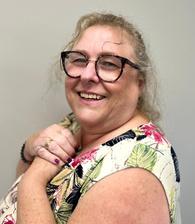


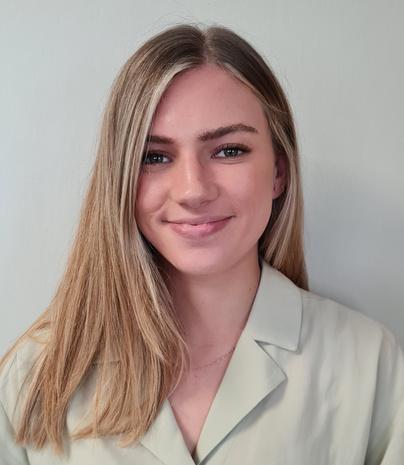


Karen Wilkinson undraising Manager wilkinson@pwsa co uk
Vicki Cooke Finance & Operations Manager vcooke@pwsa.co.uk
Patsy Lecont
PWS Specialist Team Manager plecont@pwsa.co.uk
Ruth Consterdine
PWS Specialist Team Deputy Manager rconsterdine@pwsa.co.uk
Sheila Inwards
PWS Specialist Advisor sinwards@pwsa.co.uk
Sarah Brindle
PWS Specialist Advisor sbrindle@pwsa.co.uk
Tracey O’Donnell
PWS
Lizzie Pratt Operations & Communications Officer lpratt@pwsa.co.uk
Myles Kelly Project Manager
Carey
Welcome to the first PWSA UK magazine of 2025 – a new year and so much going on here at the PWSA UK.
This is our winter edition when we are still struggling with short days and too many storms! We have lots of news to share with you and plans for the year ahead.
Sarah, one of our PWS specialist advisrrs has written an article about making a LPA (lasting power of attorney). We know from our members that financial and legal planning for people with PWS can be complex and worrying Please do get in touch if you would like more information and support.
In this edition we have updates on our new resource ‘Practical Portions’ We also have information about the PWS services you should be able to access which reflects key information from the recently published ‘Guidance for Children and Transition Into Adulthood’
Dr Robin Chung has written an update on current PWS research and please do sign up to our next webinar https://www pwsstrongertogether co uk/ for more information about PWS clinical trials
We are delighted to welcome Tracey O’ Donnell to the PWSA UK team as our new support worker in Northern Ireland We are excited about reconnecting with our PWS community in Northern Ireland so please do contact Tracey on todonnell@pwsa co uk

It is vital that we raise awareness and understanding of PWS and we hope that you heard our BBC Radio 4 appealand Colette Love’s personal story about her sister’s struggle with PWS.
We continue to make sure that the voices of people with PWS are heard and we have responded to the Law Commission consultation on disabled children’s social care
As ever none of this is possible without the fantastic fundraising efforts so a huge thank you for all you do to support our work
Please do get in touch if you want any more information about any of the articles in this edition or if you have any feedback. We always want to hear from you!

By Robin Chung
7.30pm Tuesday 25th February 2025
We are planning our third webinar in partnership with FPWR UK to provide updates on PWS clinical trials. The date is 7.30pm Tuesday 25th February 2025. You can register for this webinar and find recordings of previous webinars plus information about current trials at https://www pwsstrongertogether co uk/Webinar s

PWSA UK trustee Dr Evelien Gievers (consultant endocrinologist) is studying the late diagnosis of PWS. Improved awareness and access to early genetic
testing in the early neo-natal period should mean that all PWS diagnoses are confirmed soon after birth. Real-life population data shows that there are still late diagnoses occurring in early childhood years or even later Dr Gievers is looking at why this is happening and what can be done to improve the situation
The International Prader-Willi Syndrome Organisation (IPWSO) are investigating social care and residential settings service needs. Dr Brian Hughes is one of the organisers of this research effort – read more about it on https://ipwso org/how-we-can-help/research/
Pharmaceutical company Soleno have completed Phase 3 Trial on DCCR for PWS The drug is a once-daily diazoxide choline-controlled release (DCCR) tablets for patients with Prader-Willi syndrome. The results were mixed but show significant improvementsin hyperphagiain aprespecifiedsubgroup of patients (about half of the study population) with severe hyperphagia Soleno are now working to secure approval

for the drug in USA, UK and Europe The US FDA (federal drug administrator) regulator has delayed its final decision from December 2024 until 27 March 2025 2027. The decision is highly anticipated by all of us. The PWSA UK and FPWR UK are working with Soleno to support their submissions to the UK regulator – the Medicines and Healthcare Regulatory Authority (MHRA) regulars and NICE for an NHS funding decision funder. A key part of this is a study to demonstrate the ‘burden of disease’ and you can find out more about this at our February webinar
Acadia Pharmaceuticals are enrolling UK PWS participants (deadline extended from April 2025 to likely July 2025) in the Phase 3 “ACP-101 Compass” study of carbetocin in PWS Acadia are enrolling 170 total participants worldwide across the UK, Canada, USA and Europe for a 12week randomised double-blind placebo controlled study of the effect of carbetocin on hyperphagia in PWS The study is open to genetically confirmed PWS patients age 5 to 30 years who have increased appetite, decreased safety, and food seeking behaviour. After the 12-week study period, there will be an open label 3 year extension period where all participants will be given access to carbetocin https://www.compassPWS.com
Harmony Biosciences are enrolling PWS participants in their TEMPO study of Pitolisant in PWS. Harmony expect to recruit around 70 of the total 134 participants from UK/Europe. The TEMPO study will test whether Pitolisant improves wakefulness for PWS patients with excessive daytime sleepiness The study is open to genetically confirmed PWS patients aged 6 years and above, with excessive daytime sleepiness (EDS) and a consistent parent or caregiver The study duration is around four to six months, with the possibility of an open label extension period UK trial sites are open in Hull, Dundee, Cambridge and Edinburgh. Email: clinicaltrials@harmonybiosciences com
Aardvark Therapeutics are recruiting PWS participants for their HERO trial of ARD-101 tablet in PWS Aardvark’s HERO study will test whether ARD-101 and its action on the CCK brain pathway reduces hunger and hyperphagia behaviours. They will be enrolling PWS patients aged 13 and over with hyperphagia related behaviours https://aardvarktherapeutics com/programs/
Harvard Mass General Hospital study on transcranial magnetic stimulation. Researchers at Harvard University’s Massasschussetts General hospital are studying whether a brain pathway, the cerebellum-ventral striatum circuit, regulates appetite and satiety This study will test whether a non-invasive, non-drug based wearable headset called transcranial magnetic stimulation (TMS) reduces food intake. TMS headsets have been studied in depression, addiction, and pain control
The study is initially USA-based, but you can find out more by emailing Lhacsi@bwh.harvard.edu
There are several novel laboratory-based genetic laboratory and animal mouse model research streams including:
CRISPR-Cas9 reactivation of maternal PWS genes Prader-Willi Syndrome (PWS) is caused by loss of paternally expressed imprinted genes on chromosome 15q11 2-q13 3
Epigenome editing with DNA-targeting technologies such as CRISPR-dCas9 can be used to dissect gene regulatory mechanisms and potentially treat associated disorders such as PWS
A non-viral CRISPR-Dcas9 genetic delivery in PWS Dr Lu will use an innovative delivery system to achieve CRISPR gene activation in a new mouse model of PWS.
A team of researchers has developed a technology, referred to as “Designer” Milk Exosomes (MEs), that enables may one day enable clinicians to treat PWS at the cellular molecular level The idea is to load MEs with therapeutic compounds that restore the expression of genes that are deficient in PWS patients to normal levels Designer MEs are delivered to patients by minimally invasive nasal spray
For more information
https://www fpwr org/fpwr-fundedprojects/tag/genetic-therapy
Oxytocin for babies Researchers are making progress in evaluating the potential therapeutic benefit of oxytocin for PWS. Studies have shown a deficiency of oxytocin-producing neurons in the brains of individuals with PWS Researchers are trying to determine the exact nature and impact of oxytocin deficiency in people with PWS, whether there are benefits to treating with oxytocin, and how to best measure those benefits. There is a French academic and industry research collaborative study to trial oxytocin at birth and compare its effects in PWS babies who had oxytocin and those who didn't, to the age of 4 yearsot4b.com
https://www fpwr org/blog/is-oxytocin-for-pwsbeneficial-an-overview-of-research
Evidence from studies shows that Vagus Nerve Stimulation (VNS) may reduce temper outbursts and other disruptive behaviours in individuals with PWS Professor Tony Holland (Cambridge) undertook work to test an earbud delivered electronic device to stimulate the vagus nerve and reduce outbursts. VNS was shown to be safe and effective in two small clinical trials in the U.K.
Building on this work there is a phase three study in the USA enrolling people with PWS aged 10 –40 years of age who have disruptive behaviours
https://www fpwr org/blog/exciting-newtreatment-may-reduce-disruptive-behaviors-inpws

By Sarah Brindle, PWS Specialist Advisor
If you care for someone with PWS and they are coming up to 18 or older, we recommend you consider making a Lasting Power of Attorney (LPA) for Property and Finances. An LPA is where your loved one appoints you as their ‘attorney’ so you can make decisions with or for them if they are unable to do so This can prevent significant problems arising further down the line
In the last edition of the magazine we looked at making an LPA with the person you care for which covers their health and welfare
In this edition, we will look at why and how you make an LPA for Property and Finances and what alternative options are available Why should we make a Lasting Power of Attorney (LPA)?
When the person you care for reaches 18, unless you have an LPA in place, they are legally able to make any decision they want, including where and how to live and what to spend their money on This applies even if they have a learning disability and/or PWS.
People with PWS can be competent and articulate, and they may be able to make good decisions in many aspects of their life. However, because of the hypothalamic dysfunction in PWS, their ability to make decisions concerning food, and therefore money, will always be impaired
Being given free access to their finances risks them spending money on food which could be unsafe, potentially leading to life-threatening obesity and other serious problems
Many people with PWS are also vulnerable to financial scams and exploitation.
Putting in place an LPA for Property and Finances ensures that parents and carers can continue to be involved in the care of their loved one, helping them to make decisions with their safety and best interests at heart.
How do you make an LPA for Property and Finances?
The person you care for can only make an LPA if they have capacity to agree to it and are aged 18 or older Through this process, they appoint you as their ‘attorney’ to manage their finances if they are unable to make certain decisions (e g around money and food)
The LPA for Property and Finances can be made via a form on the government website or via a solicitor who will charge significantly more. The online form on the government website is long, but is designed for people to be able to fill out themselves If you get stuck, just call the PWSA UK helpline and we’ll be happy to help you. The fee on the government website is £87. It is significantly more in Scotland, Ireland and Wales
Once you have made your LPA for Property and Finances, you pay the nominated fee to the Office of Public Guardian (OPG) who will check to make sure all parties are happy with the agreement and understand their role. It is then stamped and registered and is legally binding.
When making an LPA, you should help your loved one to write a statement of wishes A statement of wishes is a set of instructions for each LPA, giving them advice and key points on how to execute the person’s wishes if they are not able to make decisions It’s essentially a “how to be me” manual
Talk to your loved one and think together about what is important to them Many young people want to know that they will have enough money to socialise and do the things they love. For some, buying gifts for everyone’s birthday is important
What happens if your loved one cannot or will not consent to creating an LPA? This is where it can become more complex and cost significantly more money. There are two options available; an Appointee or a Deputy
These are both people who can act on behalf of someone who is unable to make decisions for themselves. The main difference is the powers they have.
An Appointee is a person or organisation registered with the Department of Work and Pensions (DWP) to manage a person’s benefits if they lack capacity to do this for themselves
Appointees have limited powers and are responsible for managing the persons benefits, paying bills and managing a limited amount of savings They may also be responsible for organising the spending of benefits and state pension.
You can start the process of applying to be an Appointee on the DWP website here
The DWP may visit both the applicant seeking to become an Appointee and the person they will be acting on behalf of. This visit ensures that the applicant is suitable for the role and that the claimant genuinely requires an Appointee
The Care Quality Commission guidance suggests that people working directly with someone who is not able to manage their own benefits should not act as an appointee; this is because there may be a conflict of interest.
There are two different types of Deputyships, one for health and one for finances Both need to be applied for separately via the Court of Protection (COP) if there is no LPA in place
Finance Deputies are COP appointed and have much wider powers than an Appointee. They must be 18 or older. They have the same powers as an Appointee, but they can also manage bank accounts, utilities, debt, buy and sell property, hold a tenancy, manage investments and divide income Their responsibility is much bigger than an Appointee who only manages benefits.
A Personal Welfare Deputy (PWD) is appointed under Section 16 of the Mental Capacity Act 2005 to make decisions about care, support and health issues on behalf of the person who lacks capacity (they are referred to legally as P)
PWD appointments are far less common than Property & Finance Deputy appointments The MCA code of Practice suggests that Deputies for personal welfare will only be required in the most difficult of cases
This is because there is an expectation that health and social care professionals, and the persons family (P), will settle matters between them via the Best Interest Principle (Principle 4) of the MCA 2005. If they cannot agree then a standalone application can be made to the COP.
A fee of £365 will need to be paid when the application is submitted Some people may get a reduction or have the fee waived entirely depending on income and savings. In addition, a lawyer, if you have one, will also charge their fee All costs can be recovered once the Deputyship is in place, but initially the person applying will be expected to cover all costs until it’s in place
The process of being a Deputy can take four to six months Four forms must be completed, including a mental capacity assessment by a relevant professional Once the application is submitted to the Court of Protection, the applicant has a duty to notify certain categories of people, including relatives of the person lacking capacity After this notification, there is usually a two to three month wait for the Deputyship Order to be authorised. If any of the people who have been notified object to the Deputyship application, then the proceedings become contested and can take many more months to resolve
You can contact the Court of Protection by phone on 0300 456 4600 or email courtofprotectionenquiries@justic e gov uk
All applications must be submitted to the COP in paper form by post
You can find the address for the Court of Protection on the government website.
Prader-Willi Syndrome (PWS) is a rare and complex condition that requires lifelong specialist care from a diverse team of healthcare professionals As research continues to evolve, so too does our understanding of the most effective ways to manage PWS.
Best Practice Guidance
A team of expert clinicians have developed a comprehensive best practice consensus guideline document, providing the most current, evidence-based recommendations for managing PWS in children and adolescents up to the age of 18.
This guideline serves as an essential reference for families and healthcare professionals striving to provide optimal care for individuals with PWS.
The guidance covers many different aspects of PWS and conditions that can occur in people with PWS, from sleep apnoea, to scoliosis, to neurodivergence and dietary management and beyond
A user-friendly summary for families and caregivers
Recognizing that navigating medical literature can be challenging, we are creating an accessible summary of the guidelines by topic for parents and carers to refer to on the PWSA UK website
If you are uncertain about the level of care being provided to someone with PWS, we strongly encourage you to refer to these guidelines. These resources are designed to support informed decision-making and ensure that every individual with PWS receives the care they need Advocating for the best possible care and treatment
The full document has been peer-reviewed and published in Endocrine Connections, a leading medical journal. This ensures that the guidance is grounded in the latest scientific research and clinical expertise You can access the full publication here: Prader–Willi Syndrome: Guidance for Children and Transition into Adulthood.

Meet Tracey O’Donnell – PWSA UK’s New Specialist Advisor for Northern Ireland!
We are delighted to introduce Tracey O’Donnell as the newest member of the PWSA UK team! As our dedicated PWS Specialist Advisor for Northern Ireland, Tracey will be a key point of support and guidance for families navigating life with PWS With a wealth of experience in disability advisory roles, she brings invaluable knowledge and passion to her new position.
Tracey joined PWSA UK in November 2024, and from the start of 2025, she will be actively engaging with families across Northern Ireland Her role is to provide essential support, resources, and advocacy for those affected by PWS, helping to strengthen the community and improve access to vital services.
Since 2012, Tracey has worked as a pan-disability advisor across education, training, and employment Her extensive experience has given her deep insight into the challenges faced by individuals with disabilities and their families. She has had the privilege of working closely with many families and individuals, shaping her understanding of the sector and informing her professional practice.
Tracey’s commitment to supporting families is driven by her desire to make a tangible difference “I look forward to learning more about PWS and working alongside families in Northern Ireland to ensure they receive the support and resources they need,” she says
Her role will involve offering guidance, advocating for better services, and working to create stronger connections within the PWS community Whether it's providing advice, assisting with navigating healthcare and education systems, or simply being a listening ear, Tracey is ready to offer her expertise and support.
When she’s not busy working or spending time with her family, Tracey enjoys running, reading, and listening to podcasts. These hobbies help her unwind and stay energised for her work in the disability sector
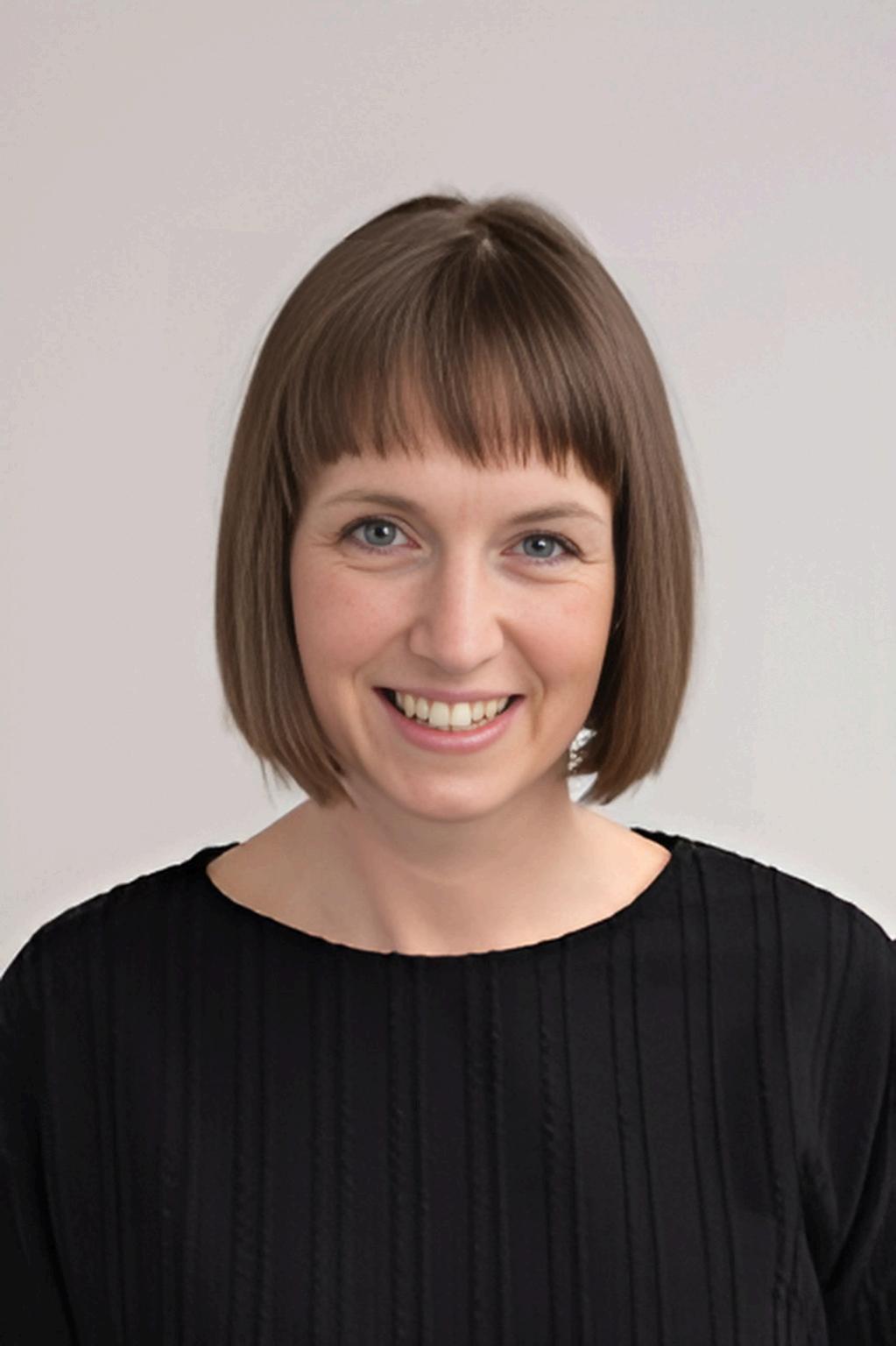

Tracey is available to support families on Tuesdays and Fridays from 9 AM to 5 PM If you have any questions or need advice, don’t hesitate to reach out to her at Todonnell@pwsa.co.uk.
We’re excited to welcome Tracey to the PWSA UK team and look forward to the positive impact she will have on families across Northern Ireland!



If you are a BBC Radio 4 listener, you might have heard a special appeal from the PWSA UK on January 19th We were lucky enough to be given a slot on the BBC Radio 4 appeal, a short broadcast which features a different charity each week This was a great opportunity for us to spread awareness about PWS to a wider audience and to raise vital funds for our helpline service
In the appeal, Colette Love, a longtime supporter of the PWSA UK, shared her personal story about PWS and why she supports the work of our charity. Colette's sister, Laetitia, was born with PWS but didn't receive a diagnosis until she was 19.
If you missed the appeal, you can still listen via BBC Soundshere
We're delighted to have had this opportunity to spread awareness about PWS and so grateful to Colette for her support
Thank you to everyone who shared and donated We are still receiving donations from the appeal and will provide an update soon on the total amount raised
Support and advisory casework 1st Oct - 31st Dec 2024 Total actions for quarter 654
We are in awe of our wonderful supporters who have gone above and beyond to fundraise for the PWSA UK recently
Thank you to all of our runners for their amazing efforts Anest completed the Cardiff Half Marathon, cheered on by her brother Rhu, who has PWS, and raised an impressive £1,000. William also completed his first half marathon, proudly crossing the finish line with his family supporting him every step of the way and raised £960 Meanwhile, Amber turned heads at the Manchester Half Marathon, not just for her fantastic effort, raising over £350, but also for her orange and purple PWS-themed nails!
In Bradford, Tracey and Michael McCallion, grandparents to Hallie, who has PWS, have really been putting the fun into fundraising! They organised their second annual event for the PWSA UK at the Gaping Goose pub with the help of landlords Garry and Jayne Hosted by drag queen Arina Fox and featuring music from DJ Phil Tickle, the event raised over £900 in-person and an additional £560 through a JustGiving page
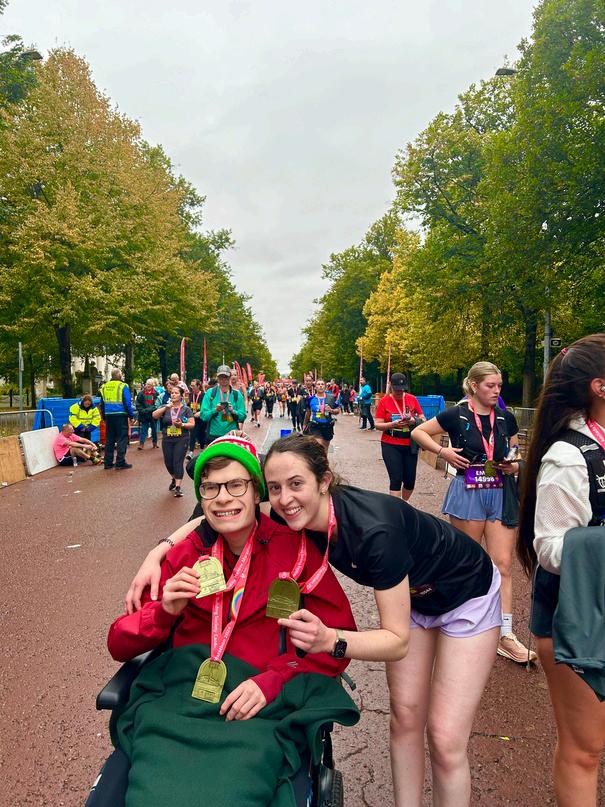
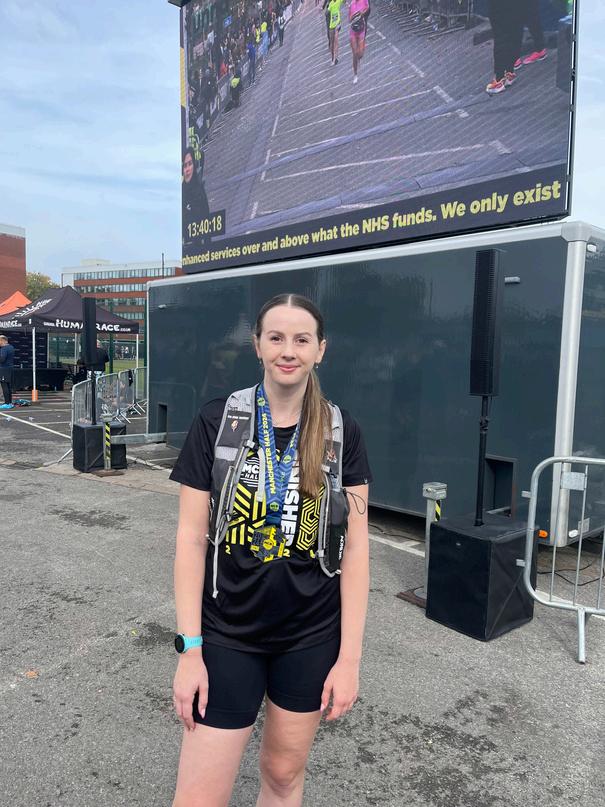



Victoria and her daughter hosted a bake sale at their local bank, raising funds and awareness in equal measure
For those who prefer their fundraisers a little more extreme, parent and volunteer Kerry took part in a Triple Ultra Sea to Summit Challenge scaling the UK’s three highest peaks taking on Ben Nevis, Scafell Pike, and Snowdon all while wearing his PWSA UK t-shirt Kerry raised a phenomenal £2,367!
Deborah, celebrating her 70th birthday, embraced adventure with a thrilling zipwire ride, raising £1010 in honour of her niece with PWS. She said “My zipwire was slightly daunting but great fun and my sons and stepchildren as well as my niece and all her family came to support me.”
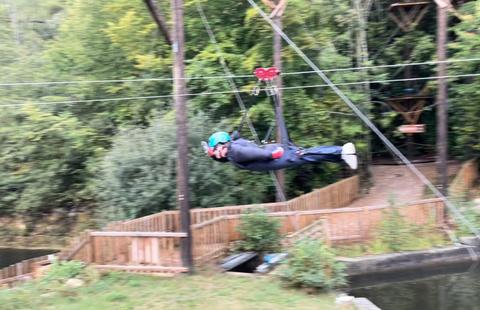




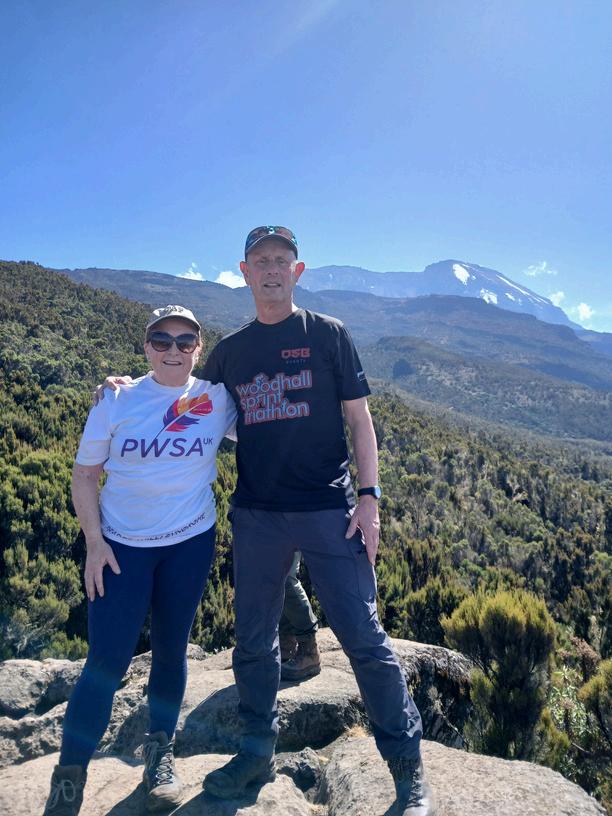


Our very own Fundraising Manager Karen, traded her desk for the heights of Kilimanjaro After eight months of rigorous training, she and her partner Andy completed the climb, turning their holiday into an incredible fundraising success raising a total of £1758 We can’t wait to see what Karen has planned for her next challenge!
In Devon, Marilyn and Rachel Pocock held a fundraising concert in the beautiful church of St Thomas of Canterbury, Thorveton The concert, which took place on a sunny September evening featured renaissance music from The Linarol Consort’s of Viols, delicious canapés, and a moving introduction from Rachel about her daughter Saskia’s journey with PWS, as well as raising a staggering £4,700
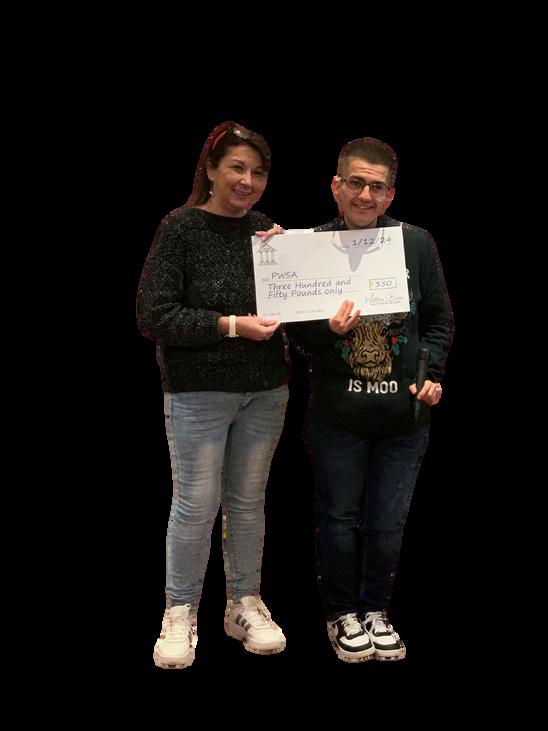
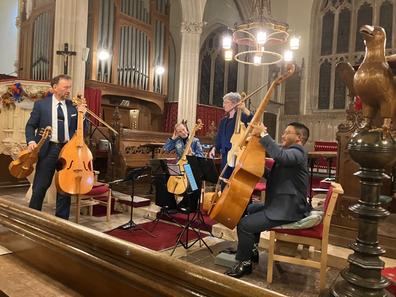
Thank you to Matthew and family who made a collection for the PWSA UK at Matthew’s Gran, Mary’s funeral in September Matthew’s mum said, “It was suggested because Mary thought the world of Matthew and always had time for him growing up.”
Remembering Mary and sending love and best wishes to Matthew and all his family.
Thank you to each and every one of you who’ve raised funds to support us. We are inspired by your dedication and creativity. Whether running, baking, climbing, or hosting events, every contribution plays a vital role With another exciting year of fundraising ahead, we invite you to get involved. If you’re planning an event, reach out we’re here to support you every step of the way
Ready for a challenge? Want to support a great cause? Check out these thrilling events:
5th April – Snowdon at Sunrise Trek up Snowdon and witness an unforgettable sunrise!
27th April – TCS London Marathon
Missed 2025? Register now for 2026 or 2027 this iconic race awaits!
6th July – Parallel Windsor
An inclusive event at Windsor with running, walking, and wheeling challenges
7th September – The Great North Run
Join the UK’s biggest half-marathon with an unbeatable atmosphere!
27th September – Abseil the National Express Lift Tower
Love heights? Descend one of the UK’s tallest towers for an adrenaline rush!
Be part of something amazing! Contact the PWSA UK for details and sign up today. https://www.pwsa.co.uk/events
Congratulations to Lucy Taylor who won 2 gold medals and 1 silver for her incredible performance in a competition against 80 swimmers across Tayside
Lucy competed in 4 races at the competition and won gold medals for the 50m back crawl and 50m breast stroke, and silver for the 50m freestyle.
Lucy says “It was a tight race as every swimmer was neck and neck, but I made it to the top three and got a silver, and I just missed out on a bronze medal in the 25m butterfly! My swim times were amazing.”
Not only has Lucy been winning medals for her swimming, she’s recently been selected to be in the Scottish judo squad!
Well done Lucy, you’re amazing

Congratulations to Fran, who became the first person with PWS (we think) to do a skydive! Brave Fran jumped out of a plane to raise money for the Mountbatten Hospice on the Isle Of Wight, and raised over £1,200!!
A big round of applause is going out to Bethanie who is achieving amazing things at school this year. Bethanie’s Mum asked for her to be given harder spellings to challenge her more and she’s smashed them every week! She’s also been commended by school for her amazing maths work and to top it all, her artwork has been selected to appear in the local community art showcase
Bethanie’s mum says “She’s so much more capable than some people give her credit for. She makes me proud every day... Bethanie 1 –PWS 0!!”


By Chris Smith, Senior Paediatric Dietitian
Many families have shared concerns about the difficulty of determining appropriate food portion sizes for children with PWS. To address these challenges, a national working group, comprised of health professionals with extensive expertise in PWS, was set up. This team included two specialist dietitians, a pediatric endocrinologist, a therapy assistant, a representative from the PWSA UK, and an endocrinology nurse They collaborated with Nutrition and Diet Resources UK, a charity that develops nutritional resources, to create a helpful tool for families The result of this collaboration is a pictorial guide designed to help in understanding suitable appropriate portion sizes. This guide visually presents ideal portion sizes for 60 common foods for six age groups: 2-3 years, 4-6 years, 7-10 years, 11-13 years, 14-18 years, and 19-64 years The resource was further improved from valuable feedback from families who care for individuals with PWS, as well as input from those living with PWS themselves
This resource serves as a valuable tool for families and caregivers, helping them provide the correct amounts of food to promote good health while preventing overconsumption and weight gain It specifies the recommended number of portions from each food group per day, allowing families to plan balanced meals and daily meal schedules.
This guide is a unique and practical resource, created to address the longstanding concerns expressed by families about portion size confusion, the difficulty of communicating appropriate food intake to others, and the challenges in helping individuals with PWS understand ideal portion sizes
We believe this guide will offer much-needed clarity and support in managing the dietary needs of individuals with PWS.
You can order your copies of the resource here: https://www.pwsa.co.uk/practicalportions

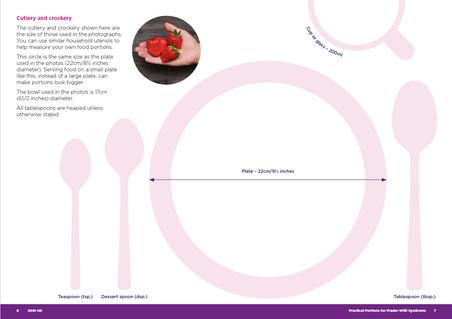
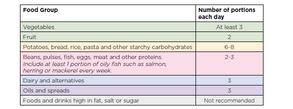



Our community events provide a unique opportunity to come together with others who understand the realities of life with PWS
Everyone is welcome We try and plan events that provide a PWS friendly environment where all members of the family can relax, build connections, and share challenges and special times together.
To sign up for an event, head to our website, go to the events section, and register your interest. A member of the team will then share a private Eventbrite link so you can register Our Eventbrite page is private to ensure our events are only accessed by members of the PWS community
https://www pwsa co uk/events
25th-28th - PWS Community Weekend at SetonSands Holiday Village, Scotland
Join us for a fun-packed seaside weekend for the whole family in the beautiful Lothian countryside.
16th-19th - PWS Community Weekend at Ty Mawr Resort North Wales.
Come and get together with other families and enjoy swimming, crafts, and much more There will be a beach party on Sunday


non PWS children equally.
19th-22nd - PWS Community Weekend at Camber Sands East Sussex.
Enjoy swimming, crafts, beach games, and more, all culminating in a Sunday party
20th Community day for Camber Sands Weekend.
17th Community Day at Rhyl Miniature Railway
Come and join us for lunch, a train ride and lots of things to do there
Community day Oxfordshire
Exact date and location coming soon!
Join us for a day on the beach! We’ll have fun beach games, walking trails, sandcastle building, and a chance to dip in the sea for those who are brave enough!
I really enjoyed the friendly community nature of the event, having never met anyone with PWS other than my baby daughter. It was amazing to see how everyone was and supported together by PWSA UK.
Want to connect with other parents and carers at the same stage of their PWS journey?
Our free online Parent to Parent groups (P2P) are support groups run by parents for parents These take place monthly or quarterly online and are a place to share experiences, discuss different topics and speak to other parents.
Register here: https://bit ly/4gwgvOB